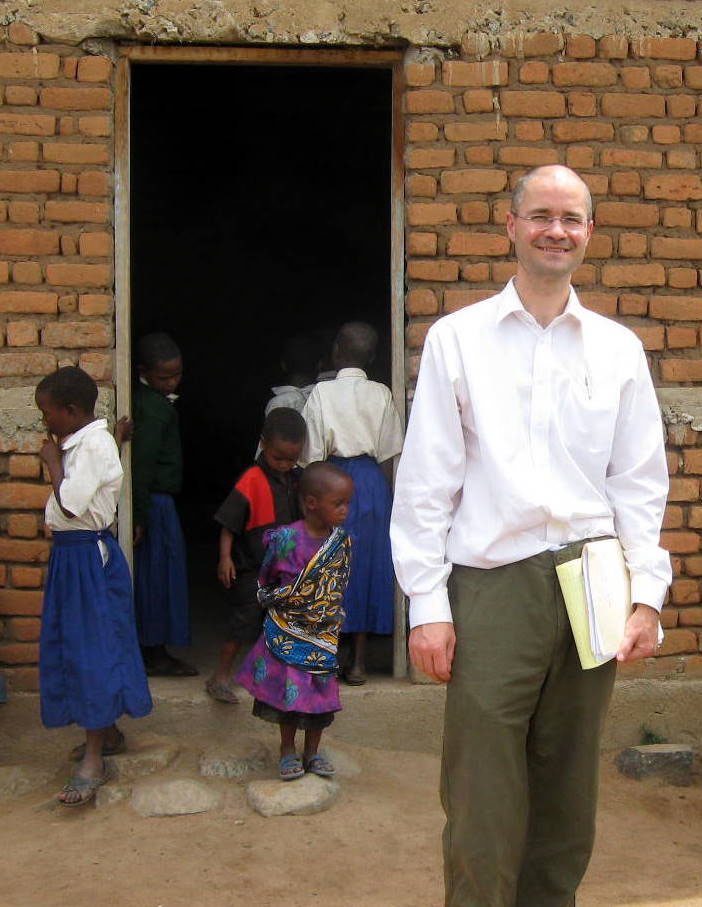February 3, 2011 — A scientist at the University of Virginia is looking to give hope via faster diagnosis and treatment to the millions of children worldwide who suffer from devastating diarrhea and malnutrition.
The U.Va. School of Medicine recently received a $3.9 million grant from the Bill & Melinda Gates Foundation to support the work of Dr. Eric Houpt, associate professor of infectious diseases, in developing a molecular diagnostic tool to detect enteric pathogens from stool samples. These pathogens cause debilitating bouts of diarrheal illness in children and are associated with growth impairment. Researchers have determined that malnutrition underlies half of all the deaths worldwide for children under the age of 5.
Currently, testing for the most 40 most common causes of diarrhea requires a variety of methods and can take several days for all the results to be evaluated – days that many children do not have, Houpt said.
"It's surprising, but even in 2010 it is not clear what are the most important organisms causing malnutrition or diarrhea," he said. "We anticipate this diagnostic molecular test can answer the question of what bacteria, virus or parasite is causing the illness in less than six hours. This will allow us to understand which are the most important agents of diarrhea and malnutrition in diverse parts of the world, and then guide targeted treatments and vaccine development.”
Houpt plans to field-test the diagnostic tools at five sites – in Nepal, Tanzania, Pakistan, Gambia and Bangladesh – to determine how well they perform under harsh conditions. Key collaborators at U.Va. include Drs. James Nataro, Dede Haverstick, Jie Liu and Mami Taniuchi.
"We've been developing these tests for a few years now, and finally have prototype assays for about 40 pathogens," Houpt said. "This project will first test them in my lab at U.Va., but there is no replacement for testing them in the real world, so an important part of the project is performance in the field."
Houpt's project will be included in a worldwide effort investigating how malnutrition and intestinal infections lead to serious lifelong physical and mental problems in children in developing countries. The main five-year study is funded by a $30 million grant from the Gates Foundation made to the Foundation for the National Institutes of Health.
The Foundation for the National Institutes of Health and the Fogarty International Center are coordinating the research effort, called the Global Network for Malnutrition and Enteric Disease Research. The network's main objectives are to create a standardized and harmonized set of epidemiological tools to accurately study the links between intestinal infections and gut physiology as risk factors for malnutrition across a number of diverse sites in the developing world.
The U.Va. School of Medicine recently received a $3.9 million grant from the Bill & Melinda Gates Foundation to support the work of Dr. Eric Houpt, associate professor of infectious diseases, in developing a molecular diagnostic tool to detect enteric pathogens from stool samples. These pathogens cause debilitating bouts of diarrheal illness in children and are associated with growth impairment. Researchers have determined that malnutrition underlies half of all the deaths worldwide for children under the age of 5.
Currently, testing for the most 40 most common causes of diarrhea requires a variety of methods and can take several days for all the results to be evaluated – days that many children do not have, Houpt said.
"It's surprising, but even in 2010 it is not clear what are the most important organisms causing malnutrition or diarrhea," he said. "We anticipate this diagnostic molecular test can answer the question of what bacteria, virus or parasite is causing the illness in less than six hours. This will allow us to understand which are the most important agents of diarrhea and malnutrition in diverse parts of the world, and then guide targeted treatments and vaccine development.”
Houpt plans to field-test the diagnostic tools at five sites – in Nepal, Tanzania, Pakistan, Gambia and Bangladesh – to determine how well they perform under harsh conditions. Key collaborators at U.Va. include Drs. James Nataro, Dede Haverstick, Jie Liu and Mami Taniuchi.
"We've been developing these tests for a few years now, and finally have prototype assays for about 40 pathogens," Houpt said. "This project will first test them in my lab at U.Va., but there is no replacement for testing them in the real world, so an important part of the project is performance in the field."
Houpt's project will be included in a worldwide effort investigating how malnutrition and intestinal infections lead to serious lifelong physical and mental problems in children in developing countries. The main five-year study is funded by a $30 million grant from the Gates Foundation made to the Foundation for the National Institutes of Health.
The Foundation for the National Institutes of Health and the Fogarty International Center are coordinating the research effort, called the Global Network for Malnutrition and Enteric Disease Research. The network's main objectives are to create a standardized and harmonized set of epidemiological tools to accurately study the links between intestinal infections and gut physiology as risk factors for malnutrition across a number of diverse sites in the developing world.
Media Contact
Article Information
February 3, 2011
/content/uva-researcher-lead-39-million-study-next-generation-molecular-diagnostic-technologies

